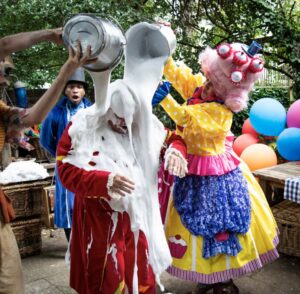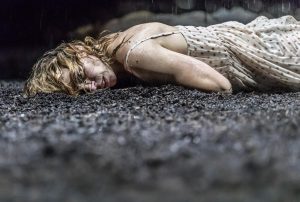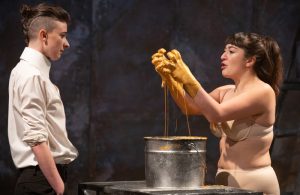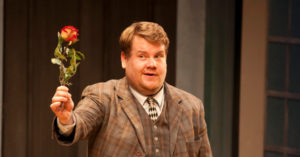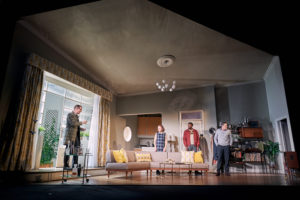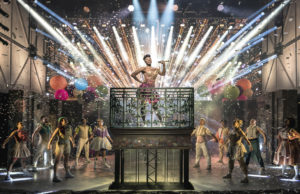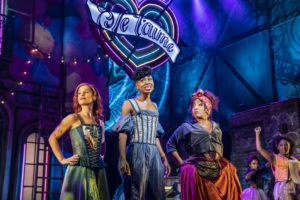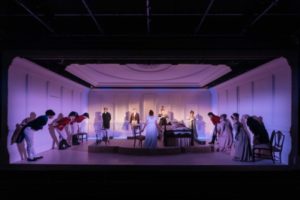The Funniest Show in The West End
★★★★

Some critics have acclaimed Pride & Prejudice* (*sort of) as the funniest show currently in London’s West End. I was late seeing this little gem at The Criterion, but I can’t disagree.
It is an outstanding achievement by Isobel McArthur. She not only wrote it, with a little help from Jane Austen, she also co-directed it with Simon Harvey, and stars in it.
What’s particularly clever about her take on Pride & Prejudice is that, although it’s a spoof, it is extremely faithful to the story. Much of the comedy derives from the same situations that are funny in the book, and it is, at key moments, quite moving. I was surprised at how touched I was by the ending.
So, she has paid homage to the qualities of the story and some of the dialogue, while extracting a great deal more lol.
It’s funny before it even starts, when we’re presented with the concept of five modern working class women playing early 19th century maids who recreate the story with makeshift costumes and props. So we have the bathos of this classic story and its characters being presented from today’s perspective. There’s 21st century language, including a lot of swearing: Darcy is described as a ’twat’ (and that’s one of the milder insults). Elizabeth tells Mr Collins exactly what he can do with his marriage proposal. So, there’s the shock of seeing Jane Austen’s reserved characters, who normally use sensitive language, mouthing expletives. But there’s also the anachronism of party food at a ball being Pringles and Wagon Wheels.
Is there no end to Isobel McArthur’s talents?
Of course, the basic material is great. Pride & Prejudice is not only Jane Austen’s most popular work but one of the most read novels written in the English language. That’s thanks in no small part to the character of Mr Darcy, played over the years on screen by Laurence Olivier, Colin Firth and Matthew McFadyen. To that pantheon, we can now add Isobel McArthur.
There have been many excellent takes on Pride & Prejudice, like Lost In Austen, Bridget Jones’ Diary, Pride & Prejudice & Zombies and a Bollywood musical Bride & Prejudice. It is without question a crowded market, but Pride & Prejudice* (*sort of) manages to stand out.
To add to the enjoyment, it’s actually a musical comedy. The story is interspersed with moments when the characters grab a microphone and sing classic romantic pop songs like Will You Still Love Me Tomorrow, Holding Out For A Hero, Young Hearts Run Free and You’re So Vain (about Darcy of course). And Lady in Red, a song by Lady Catherine de Bourgh’s relative Chris de Burgh! It’s tremendous fun, a bit like karaoke at a hen night.
The cast of five take on all the parts. Isobel McArthur is a wonderful Darcy. She conveys very well the stiff reserve that conceals a romantic heart. In addition, she plays an even more coarse than usual Mrs Bennet. Tori Burgess creates a truly obnoxious Mr Collins, Christina Gordon plays Lizzie’s sister Jane and the appalling Lady Catherine de Bourgh.
There were two understudies on the night I saw it, which is par for the course at the moment in theatre, mainly because of the Covid. I had been looking forward to seeing Hannah Jarrett-Scott and Meghan Tyler who are both highly experienced actors and were very well reviewed. However Annabel Gordon did well as quietly desperate Charlotte trapped in her hellish marriage, as well as playing the soppy Charles Bingley. Leah Jamieson acquited herself well as the strong-willed but annoyingly self-satisfied Elizabeth Bennet.
Sometimes the characters are too much of a caricature and I did expect, having set the idea in motion, that the play would give us more of the maids’ angle on events than it actually did. But it is rich in ideas and displays non-stop creativity.
I particularly liked the moment when Elizabeth looks at a painting of Darcy and Isobel McArthur slides behind the empty frame to pose as the portrait, whose eyes then follow Lizzie round the room.
There is one simple set, designed by Ana Inés Jabares-Pita, that suggests a rich household, not dissimilar in décor to the lovely Criterion Theatre, using minimal props, and with books as a motif. It features a magnificent centrepiece of a wide staircase that winds all the way up to the flies, with steps supported by books.
This is a light hearted and lightweight play. It doesn’t have the depth of Laura Wade’s Austen inspired comedy The Watsons, which I saw at The Menier, and which was due a West End transfer before Covid struck. Nevertheless, it’s just what you need to cheer you up in a year that has started as depressingly as the last one ended.
Covid is scaring audiences away from theatres, which is a shame, because this is a show that should be selling out, and looking forward to a long run, rather than closing prematurely. I recommend you to see it while you can.
Pride & Prejudice* (*sort of) is performing at the Criterion Theatre in London until 6 February. An autumn 2022 tour is planned with a possible return to London in 2023.
Click here to watch this review on YouTube





